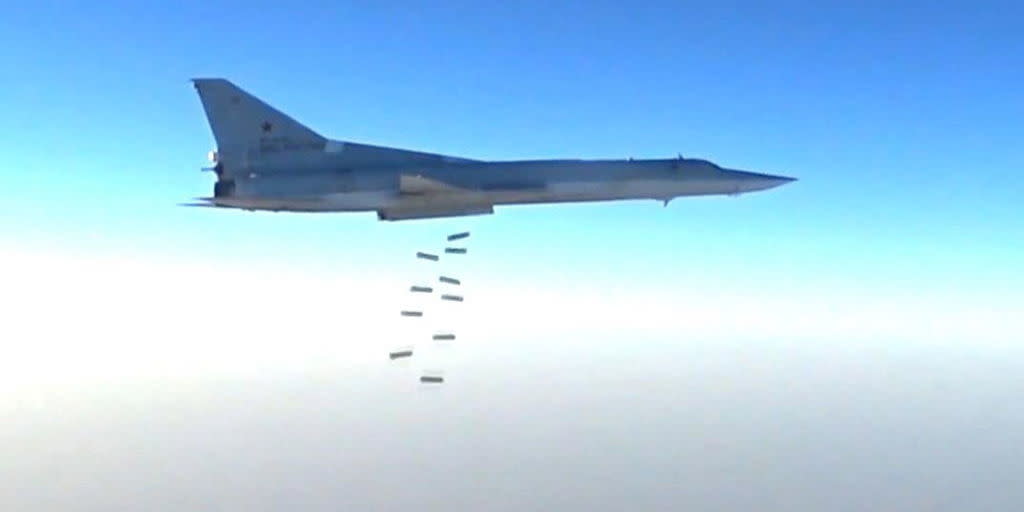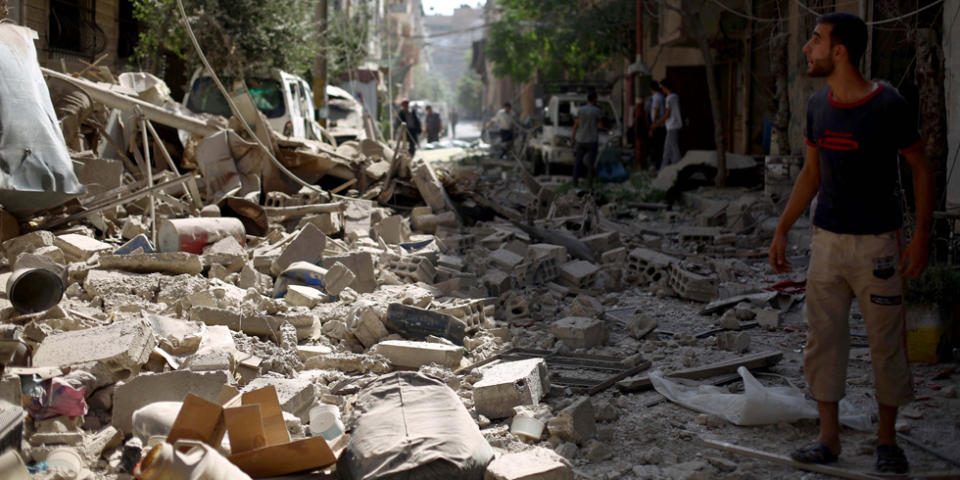We're Getting a Little Too Close to Starting WWIII in Syria

If ISIS is on the run, that's a good thing, right? Not entirely-especially if it means the troops of the United States and Russia, two nations with nukes pointed at each other's cities, are coming into contact. This is the story of how we sleepwalked up to the brink of armageddon.
For the past several years, both sides have been attacking their common foe, the outlaw terrorist group called ISIS, from different directions. The American-backed side, rebels called the Syrian Democratic Forces, is advancing on ISIS from the northeast. The Russian-backed side, the regime of the autocratic Assad family, is pushing them from the west. The whole region is hot. The skies are filled with Russian and American warplanes, while the Mediterranean Sea is thick with warships. Meanwhile, many hundreds of U.S. and Russian Special Forces troops are crawling across a battlefield marked by airstrikes, indirect artillery fire, and occasional urban warfare.
Just what in the hell is wrong with the powerbrokers of 2017?
When the US-backed rebels and Russia-backed government forces run out of ISIS buffer, they will meet. And they hate each other. In fact, they've been fighting every chance they get. In one big point of contact, a city on the Euphrates called Deir al-Zour, is already heating up. Today brought news that ought to send a chill down your spine: A Russian major is saying the SDF rebels have shelled Syrian government positions, where Russian special forces are working to clear ISIS from the area. Meanwhile, the Pentagon is saying that over the weekend, Russian warplanes bombed an SDF position where U.S. soldiers were operating.
Sooner or later, an American or Russian will be killed or captured. The reaction to that will determine if a wider shooting war will ensue between superpowers. Anyone convinced cooler heads will prevail?
Gunning for Each Other

If you were a 1950s time traveler, you'd see this escalation between the U.S. and Russia and jump into the machine, zipping back to the relative safety of that era. But if you were a time traveler from the 1970s–I know, some of us are exactly that-you might see things differently.
By the 1970s the idea of Mutually Assured Destruction had settled into the mindset in Moscow and Washington D.C. This kept the proxy wars small. One side would get directly involved in some foreign adventure, and the other side would subtly intervene to make life for the enemy as miserable as possible. This is the story of the Vietnam War, as well as its payback, the Russian invasion of Afghanistan. Russian anti-aircraft weapons appeared in Vietnam to shoot down U.S. warplanes. American shoulder-fired missiles shot down Soviet helicopters in Afghanistan.
The whole point is to keep the superpowers from killing each other directly and starting World War III
Everyone knew who backed whom, but both sides did their best to pretend it wasn't happening. The convenient lies of the Cold War's Great Game are derided as cynical, but this ability to turn a blind eye to what everybody knew kept these regional wars from becoming overt world wars.
Which raises the question: Just what in the hell is wrong with the powerbrokers of 2017? When did they lose the ability to run a limited proxy war? The whole point is to keep the superpowers from killing each other directly and starting World War III, so why are Russians and Americans trading shots in Syria?
The Shells Are Already Flying
The idea that wars burst from nowhere is stupid. The surprise Japanese attack on Pearl Harbor, which most Americans think of as the beginning of the nation's involvement in WWII, was preceded by years of escalation in diplomatic sparring, embargoes, and weapons supply. We had chose sides when wars erupted in Europe and Asia, well before Americans were trading shots with anyone.
Take a close look at recent history and you'll see a wider war brewing in slow motion. First, a civil war in Syria shatters the nation. ISIS rises in the power vacuum. The United States launches an air war to support those in the ground in their fight against ISIS, and this helps the rebels prepare to overthrow the regime. But the lack of an American presence on the ground enables the Russians to jump deeper into the fray and support the teetering government regime. Putin uses chemical weapons and gets away with it. Now more U.S. Special Forces deploy, and take more overt frontline roles as the rebels advance.
A flare-up in Syria could easily spread. It's in Russia's interest to occupy more American attention with multiple military crises at once. So, if things get serious in Syria, you can expect renewed fighting in Ukraine, military exercises on the Polish border, and the Russians tapping their influence with Iran to prompt attacks in Afghanistan.
But wars don't have to erupt, either. U.S. and Russia have set up some deconfliction rules in direct talks, and have met in the days since these incidents erupted to figure out ways to keep each other's forces safe. There are cooler heads on the scene trying to preserve the wider peace amid this horrific civil conflict.
As hopeful as that sounds, this task will get increasingly difficult as the forces close in on each other. Eventually, they will run out of ISIS targets and the rebels and the government forces will be facing each other with fully loaded weapons and superpower backers.
Where's that time machine when you need it?
You Might Also Like
